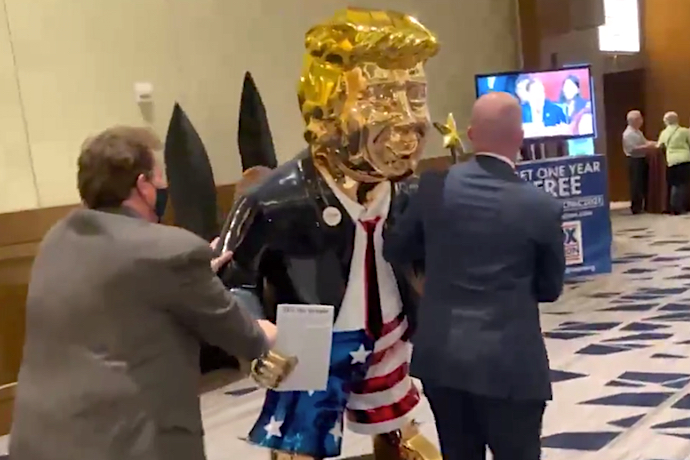Me, starting column: Well, actually, an evangelical sign-on petition calling white nationalism a heresy is not helpful for many reasons, not least because many of the 1/6 insurrectionists were themselves Christians, and there’s no standard method to determine who’s a good Christian and who’s not.
CPAC: Hold my beer:

Me: …
Okay, so let’s clear a couple of things up. First, the “radicalization of evangelicals” isn’t “creeping,” it’s pretty well advanced at this point, as illustrated by the claim itself:
Its roots are in the inextricable alliance between the Republican Party and the major branches and subcultures of conservative evangelicalism — Southern Baptists, Pentecostals and the televangelists.
Southern Baptists, Pentecostals and televangelists are evangelicalism, for better or worse, and their embrace of white nationalism has a long and ugly history. They can’t somehow be separated out from American Christianity, much less American evangelical Christianity. Yes, the faith has something to answer for in that it could bear such fruit in such numbers. That some evangelicals now wish to separate themselves from what their faith tradition has devolved into is well and good, but we shouldn’t kid ourselves about the ways that same tradition fostered the very problems to which critics now object.
Second, properly speaking the problem isn’t heresy, it’s idolatry. Heresy has to do with ideas contrary to the received truth of the faith—and indeed, the people calling for a challenge to the white nationalist heresy zero in on ideas in their statement:
While we come from varied backgrounds and political stances, we stand together against the perversion of the Christian faith as we saw on January 6, 2021. We also stand against the theology and the conditions that led to the insurrection.
This is problematic because despite the rhetoric of “one God, one faith, one baptism” there is indeed no standard authority for determining what must be believed in order to call oneself a Christian. The congregational polity embraced by the vast majority of evangelicals was designed exactly to avoid orthodoxy imposed from above, and many of the people signing on to the statement against white nationalism were the kinds who also spoke out against the Southern Baptist Convention imposing litmus tests for congregations based on abortion or support for LGBTQ inclusion.
The result of this structure, by design, is that individuals and small groups have the option of agreeing to disagree on the interpretation of the faith. That’s useful when you want to include more people, but the same sword cuts back when it comes to evicting Trumpists and violent insurrectionists. Why exactly should the Q Shaman give a flip what Doug Pagitt has to say about the true nature of evangelicalism?
And of course, the issue with white nationalism isn’t so much what people believe (or claim to believe) as it is what they do. So if lots of evangelical Christians are embracing white nationalism, that should tell you something about the character of evangelical Christianity. People are as people do, in other words. Again, it’s commendable that some people want to stand up to the way their tradition has been shifting, but a theological statement is going to be less effective in changing that tradition than it is as a form of self-definition for a subset of that tradition. And here we’re back to the age-old problem of Christians denouncing heresy and anathematizing one another.
Where heresy is concerned with the development of heterodox ideas, though, idolatry is about abandoning relationships. The whole point of the story of the golden calf, after all, is that the Israelites threw over the god they knew and interacted with—but could not see—in favor of a dumb (as in non-speaking) idol they could. You might say that CPAC crowd and the white nationalists (but I repeat myself) haven’t really abandoned their faith, they’ve just given it a particularly ugly expression.
But read the Exodus story more closely. The people complain to Aaron that their leader Moses is missing in action, and they need someone new to lead them out of the desert. After Aaron collects the Israelites’ gold and fashions the golden calf, he declares “Tomorrow shall be a festival to the Lord.” In other words, they think they’re worshiping the same God, just in a new form. Naturally, the Lord, irascible and hidden as always, disagrees.
The story tracks what we see in Trumpism: an impatient people who fundamentally distrust their leaders have found a shiny new leader to take them out of the self-perceived desert of “wokeism” and “cancel culture”; in other words, the oppression of having to cede social equality to people they don’t like. They might think they’re following the same God as other Christians, just in a new form, but then so did the Israelites.
The one good thing that might come out of the “Say No to Christian Nationalism” statement is that it gives pastors and other religious leaders something to point to in self-definition, as I say, for themselves and their congregations. That more than likely won’t change the course of white evangelicalism in America, but it might be useful in reeling back in the individuals tempted by radicalization. Indeed, that’s a focus of the statement:
Just as it was tragically inconsistent for Christians in the 20th Century to support the Ku Klux Klan and Nazi ideology, it is unthinkable for Christians to support the Proud Boys, Oathkeepers, QAnon, 3 Percenters, America Firsters, and similar groups.
We urge faith leaders to engage pastorally with those who support or sympathize with these groups, and make it clear that our churches are not neutral about these matters: we are on the side of democracy, equality for all people, anti-racism, and the common good of all people.
Along those lines, it might be good to remind ourselves of the reason for the Lord’s prohibition of idolatry. Again and again in Exodus, the Israelite God self-identifies as “the Lord their God, who brought them out of the land of Egypt,” so much so that Walter Brueggemann argues that it’s practically a synecdoche. This God isn’t jealous simply for the sake of jealousy, though. He’s jealous because he wants the Israelites to remember who liberated them from slavery, and it wasn’t that dumb (as in dumb) golden calf.
There’s only one God responsible for liberation, and that’s God, not a statue of Donald John Trump, nor Trump the man himself. I still wouldn’t hold my breath for that assertion to change the course of Christianity, and it sure won’t absolve “true” Christians of their complicity in the misdoings of their faith. But it’s never a bad thing to be reminded of, often and always.





